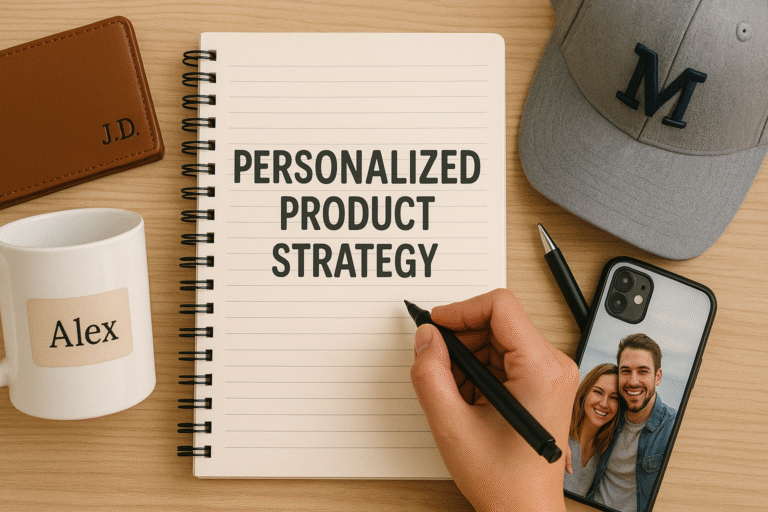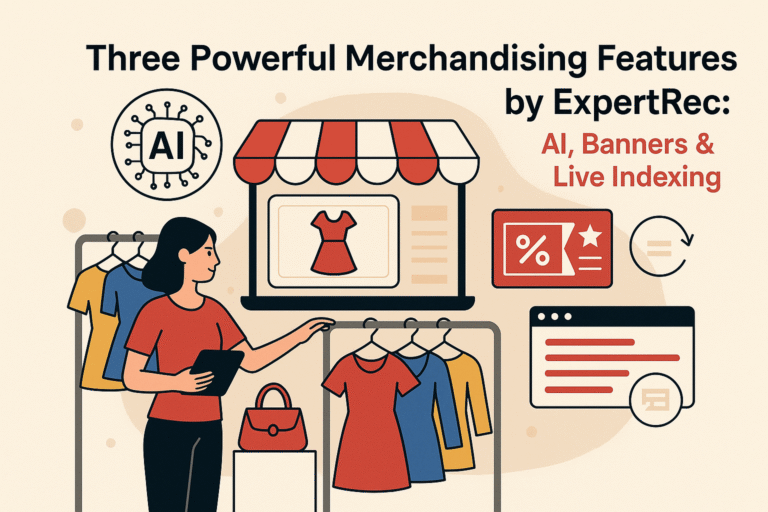In the competitive landscape of online retail, offering a unique customer experience is no longer a luxury—it’s a necessity. One of the most effective ways to achieve this is through personalized product recommendations.
Modern shoppers expect their experience to be tailored to their tastes, behaviors, and preferences. From the homepage to checkout, they want the products shown to them to feel relevant and timely. If your store doesn’t deliver that, you risk losing them to competitors who do.
In this article, we’ll explore what personalized product experiences are, how they work, whether they’re worth investing in, and what alternatives are available. We’ll also show you how Expertrec provides a simple yet powerful solution to implement personalization without the complexity or high costs.
What Are Personalized Products in Ecommerce?
In the ecommerce context, personalized products refer to product recommendations or listings that are dynamically generated based on a shopper’s unique data. This data can include:
-
Browsing history
-
Purchase behavior
-
Geographic location
-
Time spent on specific product pages
-
Cart activity
-
Device used
-
Demographics (when available)
Unlike generic listings or static best-sellers, personalized product strategies adapt in real time to each visitor’s preferences.
Types of Personalized Product Experiences
Here are several key applications of product personalization:
1. Personalized Search Results
Search results are reordered based on user behavior. For example, if a user frequently browses eco-friendly products, similar products are shown higher in search results.
Technical Implementation: Utilizes AI models like collaborative filtering and learning-to-rank algorithms to reprioritize indexed results.
2. Product Recommendations
Displayed as:
-
“Recommended for you”
-
“Customers also bought”
-
“You may also like”
These widgets appear on product pages, homepages, and checkout flows.
Backend Technology: Recommendation engines often rely on matrix factorization or deep learning-based similarity scoring.
3. Dynamic Email Campaigns
Personalized product suggestions are sent through email based on abandoned carts or previous purchases.
Integration: APIs link behavioral data to email marketing platforms like Mailchimp or Klaviyo.
4. Personalized Landing Pages
Landing pages adapt in real time to user segments, such as showing region-specific products to international shoppers.
Delivery: Requires server-side rendering or frontend frameworks with A/B testing logic.
Benefits of Personalized Products
Implementing product personalization brings measurable benefits:
-
Higher Conversion Rates: Shoppers are more likely to buy when shown relevant products.
-
Increased Average Order Value (AOV): Smart upselling and cross-selling boost basket size.
-
Improved Retention: Returning users feel understood and valued.
-
Reduced Bounce Rates: Relevant suggestions keep users engaged.
-
Customer Satisfaction: Personalized experiences create loyalty and trust.
Is It Worth Using Personalized Product Technology?
Let’s assess whether personalization is truly worth your investment.
Pros:
-
Increased revenue through tailored experiences
-
Better user experience and engagement
-
Real-time behavioral adaptation
-
Competitive advantage in saturated markets
Cons:
-
Complex to implement without technical support
-
Data privacy and compliance (GDPR, CCPA) concerns
-
Ongoing tuning of algorithms and models
-
High cost of enterprise solutions like Salesforce Commerce Cloud or Dynamic Yield
Conclusion: Yes, it’s worth it if you have the right tool that balances power, ease of use, and affordability.
Are There Better Alternatives to Complex Personalization Engines?
Many top-tier personalization engines are resource-heavy, costly, and difficult to integrate into small or mid-sized online stores.
While powerful, these platforms often require:
-
Developer setup and ongoing maintenance
-
High monthly costs or usage-based pricing
-
Complex data modeling and machine learning expertise
Smaller stores need simpler alternatives that offer similar outcomes with less overhead.
Expertrec: Personalized Products Without the Complexity
Expertrec offers a plug-and-play personalization engine designed specifically for eCommerce brands that want to deliver tailored search and product recommendations—without writing code or managing infrastructure.
Key Features:
-
Personalized Search: Automatically ranks products based on user behavior and preferences.
-
AI-Driven Recommendations: Widgets like “Similar Items,” “Trending Products,” and “People Also Viewed.”
-
Real-Time Analytics: See which products are converting per user segment.
-
Cross-Platform Compatibility: Works with Shopify, WooCommerce, Magento, and custom sites.
-
No-Code Setup: Just copy-paste a JavaScript snippet or use the available plugins.
-
Affordable Plans: No per-search or per-click pricing.
Technical Capabilities:
Expertrec uses a lightweight recommendation engine that supports:
-
User segmentation
-
Clickstream analysis
-
Real-time ranking updates
-
GDPR-compliant data tracking
Whether you’re a niche brand or a multi-category store, Expertrec enables intelligent personalization without developer dependency.
Final Thoughts
Personalized products are no longer optional in today’s eCommerce environment. Shoppers expect relevant, tailored experiences—and delivering that leads to better engagement, higher sales, and stronger customer relationships.
While enterprise-level personalization engines offer extensive functionality, they often come at a steep cost and complexity. For small to mid-sized brands, Expertrec is a reliable alternative that provides advanced personalization capabilities through an easy, no-code platform.
If you’re looking to improve your product discovery, boost conversion rates, and retain customers—personalization through Expertrec is a proven solution.
FAQs About Personalized Products
It’s the process of tailoring product listings, recommendations, and search results to individual users based on their data and behavior.
Q2. How does personalization improve conversions?
Personalized experiences show users the products they’re most likely to buy, shortening the purchase cycle and improving satisfaction.
Q3. Is personalization expensive to implement?
It can be, depending on the platform. However, solutions like Expertrec offer affordable, no-code personalization that’s ideal for smaller businesses.
Q4. Can personalization be done without a developer?
Yes. Expertrec’s plug-and-play solution enables full personalization without coding skills or complex configuration.
Q5. Does Expertrec offer real-time product recommendations?
Yes, it provides real-time, behavior-based product recommendations using lightweight AI models.
Q6. Is user data required for personalization?
Yes, but Expertrec only tracks behavior relevant to improving product discovery. It also complies with GDPR and CCPA.
Q7. What kind of stores can use Expertrec?
Any online store—from fashion to electronics—can use Expertrec, as it supports major platforms and custom-built sites.
Q8. Can Expertrec personalize both search and recommendation widgets?
Absolutely. It integrates personalization into both search rankings and product carousels throughout the user journey.
Q9. How long does it take to integrate Expertrec?
You can go live in under an hour using their dashboard or ready-made plugins.
Q10. Does personalization slow down website speed?
Not with Expertrec. Its lightweight scripts are optimized for speed and performance, ensuring seamless integration.




